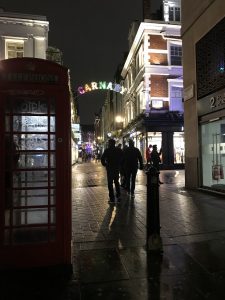Managing time, money and entertainment can be quite a task for a student. For example, going to see a movie can mean long travel times and costly dining out options. So, here are my tips for those of you travelling to City’s Northampton Square campus or Cass Business School on a regular basis – or if you also happen to live in one of the student halls of residence in and around Islington.
The Barbican Centre is a five-minute walk from Cass Business School and about fifteen minutes from Northampton Square. The first thing you will notice about the Barbican is its awe-inspiring Brutalist architecture. The towers of concrete rising to become part of the London skyline are a sight. But why should you visit the Barbican at all? Well, I have taken advantage of their various student offers, including the Student Tuesdays and Monday Madness offers on their cinema tickets, which means that you can enjoy the latest releases for as little as £5 or £6!
Also, during winter, if they are playing host to the Royal Shakespeare Company, you may be able to enjoy a theatre ticket for as little as £10 when you purchase day seats. Last but not the least, the Barbican Centre is home of the London Symphony Orchestra, which often offers £10 Wild Card tickets (but they may seat you anywhere, potentially, including in the stalls).
While you are having all this fun, you can have tea surrounded by greenery in the Barbican Conservatory, which is open to the public on the weekends. Just take your laptop and textbook on any afternoon you are feeling bored, and the Barbican will likely brighten your day.
On the subject of cinema, the Barbican Centre is not your only option. Vue Islington (opposite Angel Station) offers discounted tickets on Mondays. If 3D is not for you, they have the next best thing to IMAX as well – their 2D-Xtreme large screen theatres. I have purchased tickets for £7.50, a definite bargain!
If you fancy a walk or like to go running, I cannot impress upon you enough the revitalising effect of spending the sunset hour visiting St. Paul’s Cathedral, the Millennium Bridge and the Shakespeare’s Globe. They lie in the same direction, beyond the Barbican Centre.
For now, this covers the Islington and City of London side of things. On the Shoreditch side, however, you have restaurants, cafes and diners. Now feel free to indulge guilt-free there with all the travel time and money you’ve saved. The area is a delight for fans of pan-Asian and Indian cuisine and fancy cocktails.
And there it is, between the triumvirate of Angel, Shoreditch and Blackfriars Pier, the campus and life of a City student!





 I hail from the frozen tundra of Minnesota, and after my undergraduate studies I lived in the city of Minneapolis. I went through all the standard steps to adulthood. I got my undergraduate degree from the University of Minnesota’s School of Journalism, where I studied public relations, as I had a knack for writing, strategy and building relationships.
I hail from the frozen tundra of Minnesota, and after my undergraduate studies I lived in the city of Minneapolis. I went through all the standard steps to adulthood. I got my undergraduate degree from the University of Minnesota’s School of Journalism, where I studied public relations, as I had a knack for writing, strategy and building relationships. Two years later and I had become a guru in planning events and catering management. The catering company had strong values and produced events that were organic, waste-free and showcased delicious local food made from scratch. I was able to immerse myself in the local food community, from farmers to distributors and other restaurant owners.
Two years later and I had become a guru in planning events and catering management. The catering company had strong values and produced events that were organic, waste-free and showcased delicious local food made from scratch. I was able to immerse myself in the local food community, from farmers to distributors and other restaurant owners.


